A
Age restrictions
No one under 21 is permitted in casinos, and minors under 18 years of age are not permitted on the Strip without a parent or guardian after 9pm on weekends and holidays. The state of Nevada does not permit anyone under the age of 21 to drink alcohol in public places, and you should keep some kind of picture identification, such as a passport or driving license, on your person, in case you are asked for proof of age.
B
Budgeting
Credit and direct debit cards are accepted throughout Las Vegas. You’ll find cash machines in most hotel lobbies. To avoid high surcharges levied on non-bank ATM machine transactions, consider getting cash back from purchases at a non-casino business. The days of rock-bottom deals in Las Vegas may be a thing of the past, but it’s still possible to enjoy all-you-can-eat buffets, cheap (or even free) casino bar drinks, and midweek hotel package deals. Today, though, the sheer quality of the lodging and dining options, shows, and attractions is so tempting, a couple should consider budgeting at least $100 per day, excluding accommodations, to take advantage of all Las Vegas has to offer – more if high-end dining and the most popular shows interest you. Big conventions (a year-round phenomenon in Las Vegas) affect prices and cause hotel rooms and shows to sell out. Savvy travelers plan their trips around these, if possible.
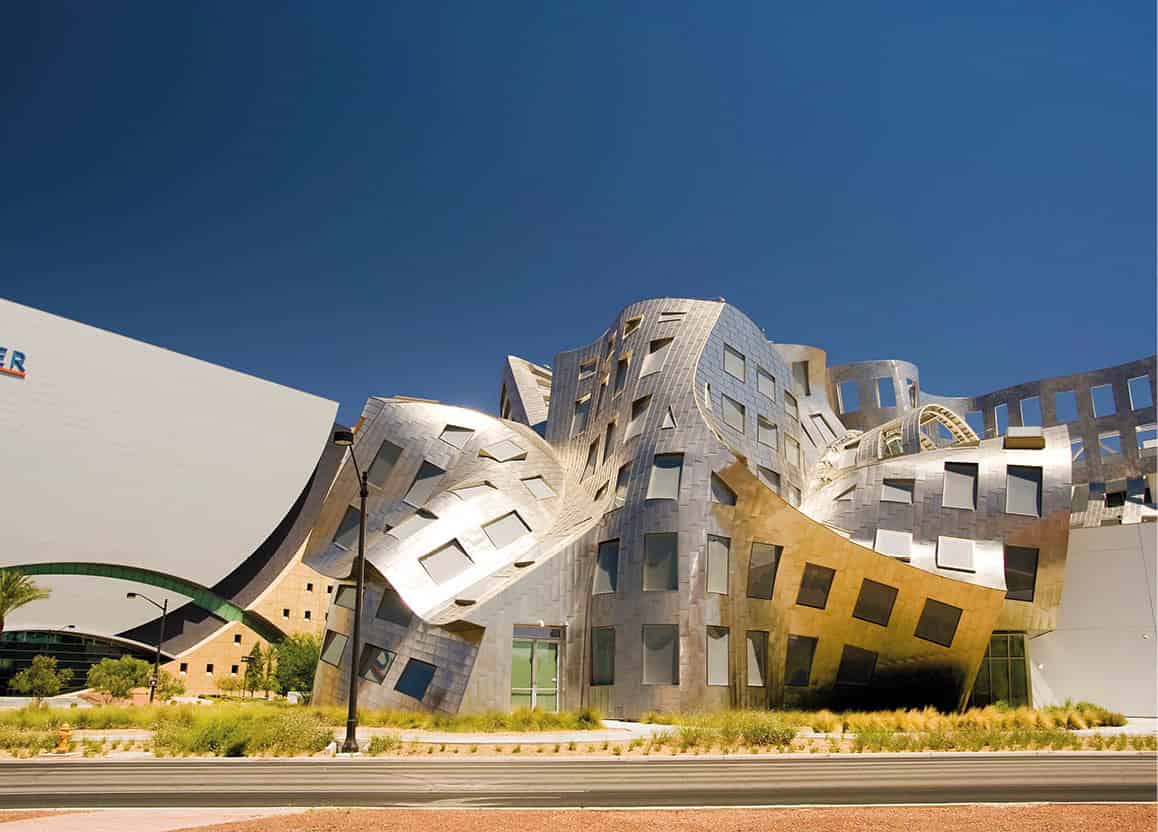
The Cleveland Clinic
Al Argueta/Apa Publications
C
Children
Child-friendly resorts, such as Circus Circus and Excalibur, often allow kids under 12 to stay for free in their parents’ rooms, and have well-priced buffets that are ideal for families. Most hotels have pools, and many provide programs for children and teenagers, while babysitters and childcare facilities are also sometimes available.
Although Las Vegas remains primarily a gaming destination, families will have no difficulty finding activities suited to children on the Strip. In addition to the suggestions on our Las Vegas With Kids tour (for more information, click here), there’s bowling at Orleans and Green Valley Ranch; and a number of outdoor attractions, such as Valley of Fire State Park, Red Rock Canyon, Hoover Dam, and surrounding national parks that are tailor-made for youngsters. A car is recommended if you are visiting with children: walking distances are much greater than they appear, especially in hot desert sun.
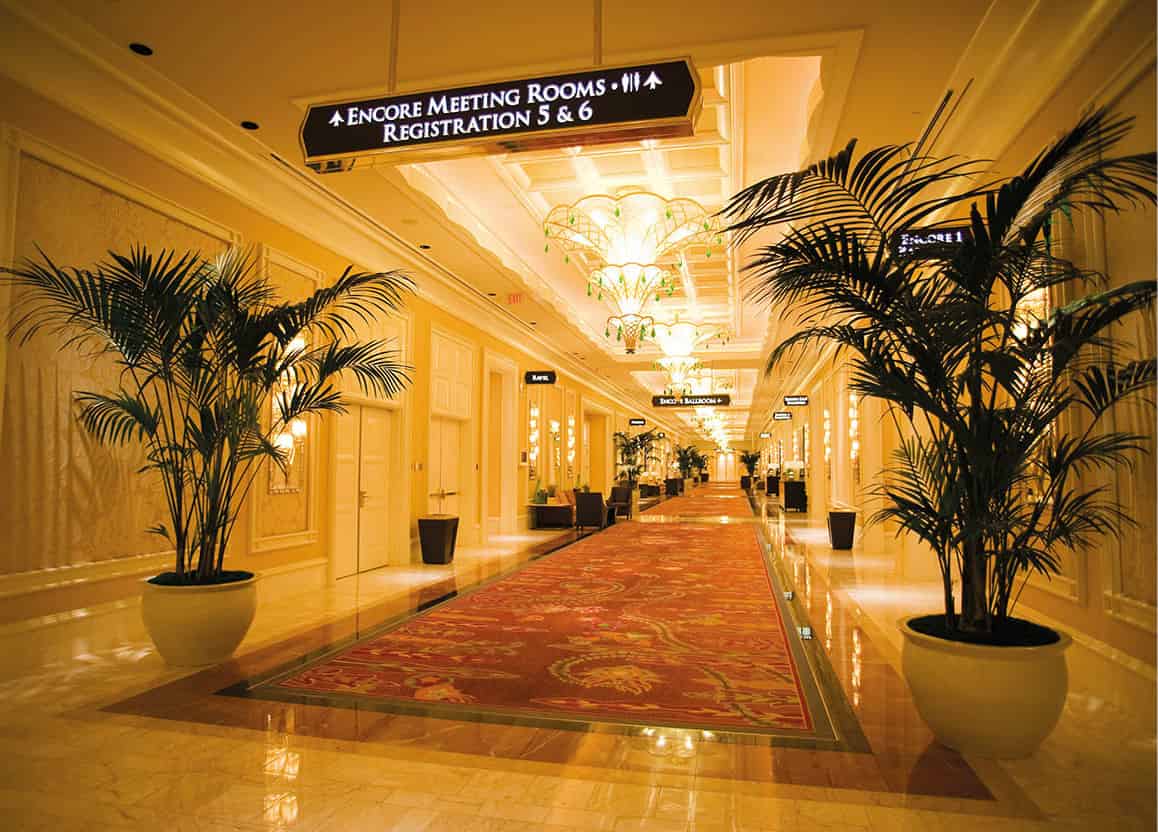
Hallway at the Wynn
Al Argueta/Apa Publications
Childcare
There are onsite childcare centers at all Coast Casinos and Station Casinos, including the Orleans, Green Valley Ranch, South Coast, Sunset Station, Gold Coast, and Palace Station. Kids aged between 2 and 12 are welcome for a maximum of five hours daily from 9am to midnight (to 1am on Sat). The fee is around $6 per child per hour. Parents must remain on the premises.
The Westin Lake Las Vegas Resort & Spa is an ideal location to take your children and it offers a number of recreational facilities, even if it doesn’t make them immediately apparent on its website. To this end, it’s probably only advisable to stay here if you do have kids, because the pool can be overrun with children during the day.
Climate
Las Vegas is in the Mojave Desert and is hot and arid with extreme temperature ranges. The average rainfall is just over 4 inches (10.5cm) a year, and humidity is frequently below 10 per cent in summer. Average highs in summer top 100°F (38°C) daily with nighttime lows of 71–81°F (22–27°C). Things start cooling down in November, with winter highs in the upper 60s°F (20°C) and lows in the upper 30s°F (4°C), with higher precipitation and the occasional snowfall. The best time to visit is fall or spring, when daytime temperatures are balmy and nights are cool.
Clothing
In summer, pack light, casual, breathable clothing; a bathing suit; a broad-brimmed hat; sunglasses; neck protection; sunscreen with an SPF of 30 or above; and sturdy lightweight walking sandals or lace-ups for walking the long distances around hotels/casinos and museums, the Strip, Downtown, and excursions to surrounding outdoor attractions. Although shorts and T-shirts are the norm, those in the know bring long-sleeved shirts and pants (trousers) to protect exposed skin from strong sun in summer and fierce air-conditioning inside buildings. Formal attire is rarely necessary: one dress-up outfit for women and a jacket for men are all you’ll probably need. Between November and April, temperatures can get surprisingly chilly, so bring a sweater with you. Any time except summer wear layers and carry a waterproof jacket and a hat.
Crime and safety
Visiting Las Vegas is safer than ever these days, with few violent crimes reported and very visible policing, private security guards, and surveillance cameras in public places, as well as VIVA Patrol volunteers trained by the police available to help out in tourist areas. Theft of personal property is quite common, however, so keep an eye on your belongings in busy areas, keep valuables locked in in-room safes, and buckets of coins in your lap, not next to slot machines in casinos.
Currency and taxes
American dollars come in bills of $1, $5, $10, $20, $50, and $100. The dollar is divided into 100 cents. Coins come in 1 cent (penny), 5 cents (nickel), 10 cents (dime), 25 cents (quarter), 50 cents (half-dollar), and $1 denominations.
There is no value-added tax (VAT) in the US, and Nevada does not charge state taxes. The city of Las Vegas does charge a local sales tax, however: 8.1 percent on purchases and 10 percent on hotel rooms (an extra 3 percent tax is added to some rooms on or near the Fremont Street Experience). Car-rental companies charge both sales tax and service fees.
Customs
You can bring the following duty-free items into the US: 1 liter of alcohol (if over 21 years of age); 200 cigarettes, 50 cigars (not Cuban), or 4.4lb (2kg) of tobacco (if over 18 years of age); and gifts worth up to $100 ($800 for US citizens). Travelers with more than $10,000 in US or foreign currency, traveler’s checks, or money orders must declare these upon entry. Meats, fruits, vegetables, seeds, or plants (and many prepared foods from them) are not permitted and must be disposed of in the bins provided before entering. For more information, contact US Customs & Border Protection (877-227-5511; www.cbp.gov).
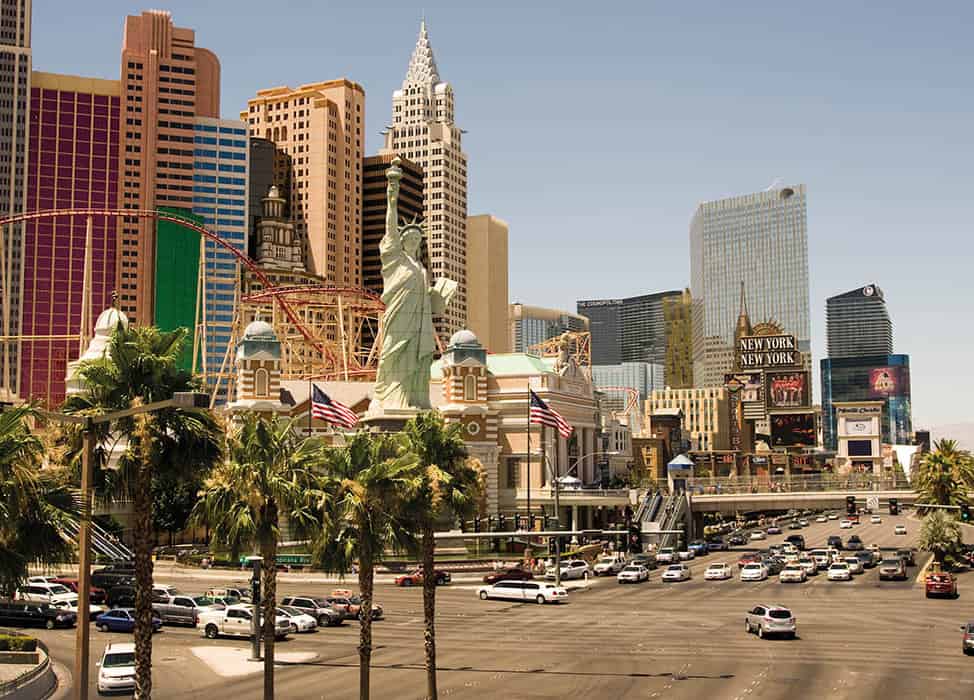
New York New York
Al Argueta/Apa Publications
D
Disabled travelers
Las Vegas attracts many seniors and has the largest number of ADA-accessible guest rooms in the nation. Casinos are almost always on the ground floor, and hotel resorts typically have elevators and ramps in addition to stairs, making them easy to get around for visitors with reduced mobility. For more information, request the free Access Las Vegas brochure from the Las Vegas Convention and Visitors Authority’s ADA Coordinator (tel: 702-892-0711; 800-326-8888; www.lasvegas24hours.com).
E
Electricity
The US uses 110 to 120 volts AC (60 cycles). If visiting from outside North America, you may require an electrical adapter for any electronics or appliances you want to bring. Las Vegas electrical outlets accept the standard North American plug with two flat parallel pins.
Embassies
Foreign embassies are all located in Washington, DC. Phone numbers include Britain (tel: 202-588-6500); Ger-many (tel: 202-298-4000); France (tel: 202-944-6000); and Australia (tel: 202-797-3000). Call directory enquiries (tel: 118) or check www.directoryenquiries.org for the numbers of other embassies.
Emergencies
In case of emergency, call 911. Dial 311 to report a non-emergency incident.
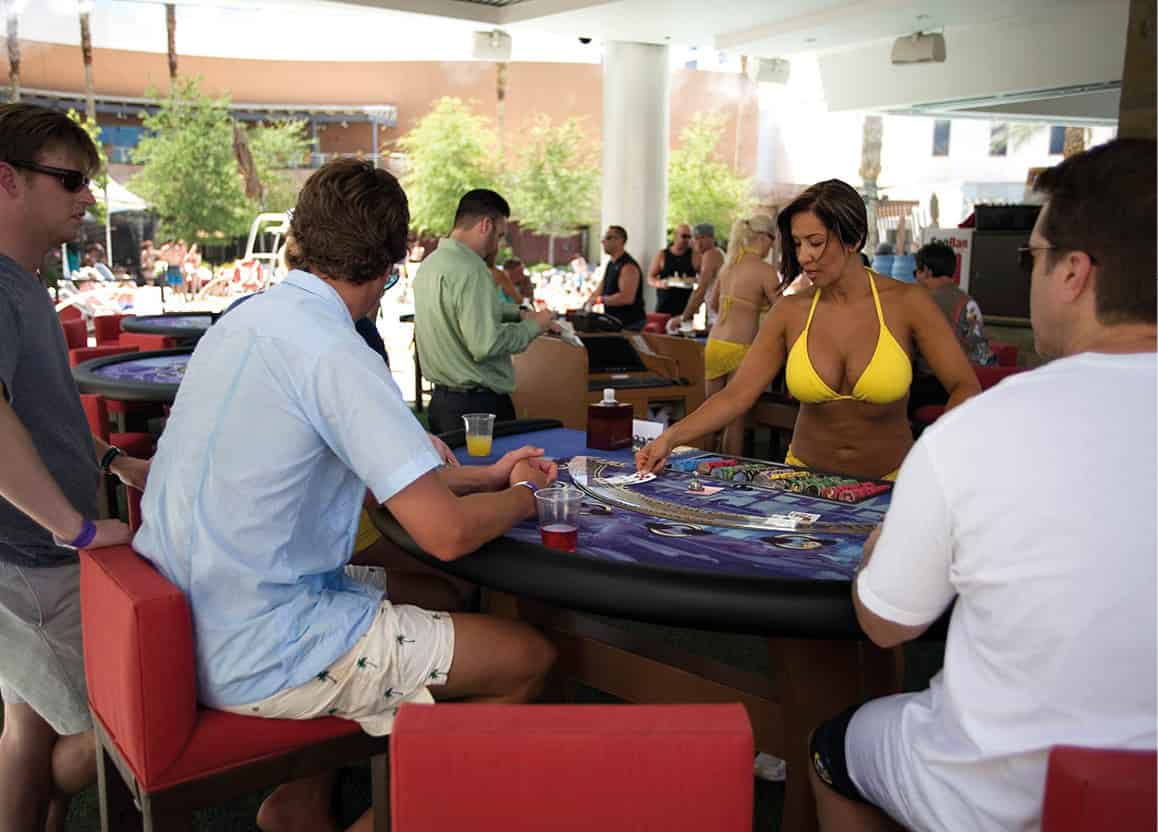
Gambling at Ditch Fridays Pool Party
Al Argueta/Apa Publications
G
Gambling help
Some people gamble unwisely and get in over their heads, and for them help is just a phone call away. Sponsored jointly by the Nevada Resort Association and the Nevada Council on Problem Gambling, trained counselors stand by 24 hours a day at 800-522-4700, and all calls are confidential. Gamblers Anony-mous, a nationwide program for gambling addicts similar to Alcoholics Anonymous, is also active in Las Vegas. There are meetings daily in and around Las Vegas. Their hotline is 888-442-2110 or log on to www.gamblers-anonymous.org.
Gaming etiquette
Players must be 21 years or over. No cell phones or electronics are allowed anywhere on the casino floor. Smoking is still permitted in casinos (but largely prohibited elsewhere in the city, for more information, click here).
Gay and lesbian
The Gay and Lesbian Center (401 South Maryland Parkway; tel: 702-733-9800; www.thecenterlv.com; Mon–Fri 11am–7pm, Sat 10am–3pm) provides plenty of information including a guide to local gay and gay-friendly bars. A number of print publications, available at the Blue Moon Resort, and many other locations around town, help visitors and residents get in touch with Las Vegas’s LGBTQ community. The city’s original gay underground newspaper, the Vegas Gay Times, started publication very secretly in 1979 and later became the Nevada Gay Times, then the Las Vegas Bugle. Today, no longer underground, it has evolved into QVegas, a slick monthly magazine (www.qvegas.com). It is published by VGM LLC (4575 Dean Martin Drive Place; tel: 866-483-4271).
Guided tours
One of the beauties of Las Vegas is that it’s an excellent jumping-off point for a remarkable variety of scenic attractions within a day’s drive. Most tour operators aim their tours at short-term visitors interested in seeing attractions from the comfort of an air-conditioned bus, Jeep, helicopter, or light aircraft. But you can also find guided tours aimed at outdoors and history buffs, including bicycle tours, back-country Jeeping, white-water rafting, and ghost towns.
Guided tours of Hoover Dam, Red Rock Canyon, Lake Mead, Death Valley National Park, the North Rim of Grand Canyon National Park, as well as Zion and Bryce National Parks, are available through reputable tour operators such as Gray Line Bus Tours, Pink Jeep Tours, Papillon Helicopter Tours, Desert Eco Tours, Black Canyon River Adventures, and Escape Adventures/Las Vegas Cycl-ery, to name a few. Pick-up is usually available at hotels on the Strip.
A handful of tour operators offer tours of Las Vegas itself. Gray Line Bus Tours (tel: 800-472-9546; www.grayline.com) has a nightly six-hour “Neon & Lights” tour, which combines bus ride and walking. A daytime tour takes in Clark County Museum, a history museum.
The 2.5-hour “Haunted Vegas Tour” (tel: 702-677-9015; www.hauntedvegastours.com; 9pm Sat–Thu), based at the Greek Isles Hotel and Resort, combines a cheesy show and guided bus tour to sites such as the Motel of Death (where several celebrities have been murdered), with tales about the restless shades of Bugsy Siegel, Liberace, Elvis, and others.
Vegas Walks (tel: 702-367-1054; www.vegaswalks.com) does historical walking tours of the Strip with guides – a good way to get a handle on Las Vegas’s dizzying changes over the last few decades.
Also leisurely is Balloon Las Vegas (4390 Polaris Avenue, Las Vegas; tel: 702-553-3039), which rounds off both its sunrise and sunset flights with a Champagne celebration.
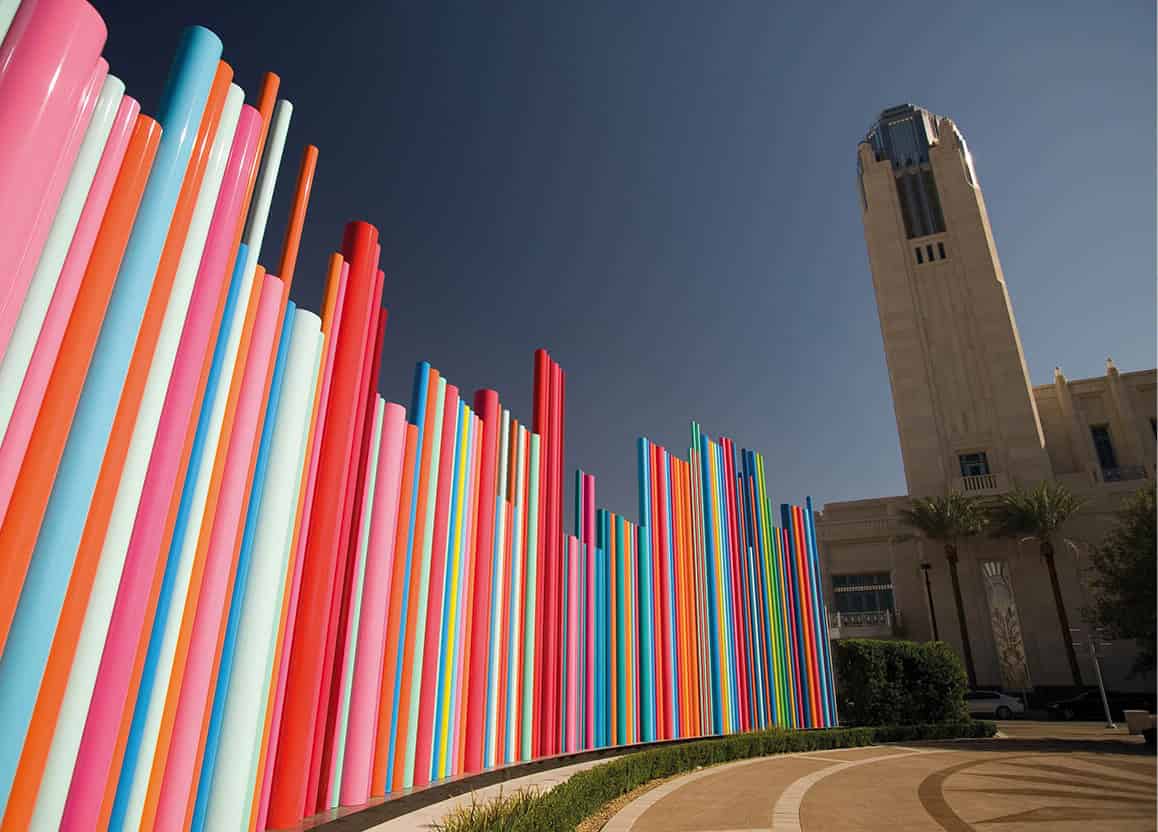
Sculpture outside the Smith Center for the Performing Arts
Al Argueta/Apa Publications
H
Health
Human beings were not designed to walk around in 100°F (38°C) midday temperatures; hang out in artificially cold, air-conditioned environments; remain seated almost motionless for hours at a time in a casino; eat large quantities of food at an all-you-can-eat buffet; or stay awake for 24 hours at a time. But then the Las Vegas Experience is not the everyday one. It’s an extreme blowout of just a few days’ duration, for most people. That’s what makes it so much fun! In order to keep the fun coming, take the following general precautions, none of which should interfere with having a good time; it should, in fact, prolong it.
Wear a sunblock of 30SPF, sunglasses, a broad-brimmed hat, long-sleeved breathable clothing, and sturdy walking shoes when you walk around outside. Savvy desert residents (including native wildlife) are active outdoors in the early morning, before the sun gets too strong, and in the evenings, after the sun goes down. Your best bet is to stay inside between 2pm and 6pm, the hottest time of day in the desert, perhaps napping, pampering yourself, and/or visiting a museum, then stroll down the Strip and around Downtown for dinner, to catch a show, or see Las Vegas’s amazing neon lights.
Keep a one-liter water bottle with you (and keep sipping on it) at all times, to avoid dehydration, and snack on nutritious foods such as salty nuts to maintain an electrolyte balance in the body, especially if you’re also drinking strong coffee and alcohol or taking medications, which are very dehydrating. Drinking too much water and eating too little food (hyponutremia) is an underreported danger in the desert, with serious health consequences.
Visitors with fair skin and light-colored eyes should be particularly alert for signs of heat exhaustion (red face, sweating, dizziness), which can come on quickly without you realizing it due to low humidity. Its more serious second stage, heat stroke (pale skin, dizziness, nausea, and lack of sweat), indicates a dangerous overheating of the body core and inability to cool down and should be treated medically, if suspected. To avoid problems, keep the skin and clothing wet (a wet bandana around the neck is an excellent idea) and keep the skin covered to maintain homeostasis in the body. Be careful around the pool. Plunging into cool water when your body has become overheated is inadvisable.
Medical assistance
Walk-in medical clinics are much cheaper than hospital emergency rooms for minor ailments. Foreign visitors are strongly advised to purchase travel insurance before leaving to avoid high urgent-care costs.
University Medical Center (UMC) operates 11 Quick Care clinics in Las Vegas (www.umcsn.com). Two 24-hour medical services are available: 24 Hour Vegas Hotel Doctor (tel: 702-677-2644) and Vegas Quick Care (tel: 702-337-0989). Nearby are the Summerlin Hospital Medical Center (tel: 702-233-7000), Boulder City Hospital (tel: 702-293-4111), and Lake Mead Hospital (tel: 702-657-5512).
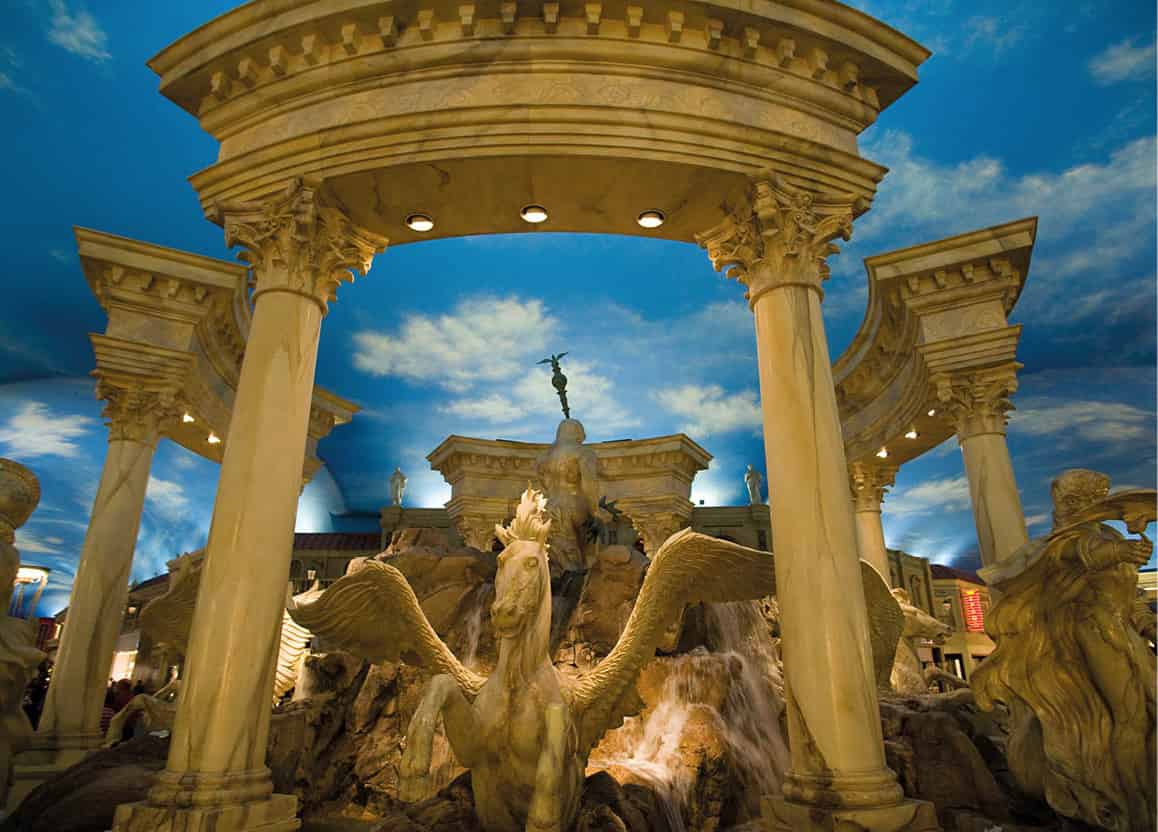
Forum shops at Caesar’s Palace
Al Argueta/Apa Publications
Hours and holidays
Las Vegas is a city that never sleeps, and casinos are open 24 hours, every day of the year, as are many service stores, supermarkets, and other businesses. Banks usually keep business hours of 9am to 3pm on weekdays and one evening until 6pm. Post offices are open from 9am to 6pm weekdays and 8am to noon on Saturday.
Public holidays
Public holidays include: New Year’s Day (Jan 1); Martin Luther King Day (3rd Monday in Jan); Washington’s Birthday (3rd Mon in Feb); Memorial Day (last Mon in May); Independence Day (July 4); Labor Day (1st Mon in Sept); Columbus Day (2nd Mon in Oct); Veterans’ Day (Nov 11); Thanksgiving (4th Thu in Nov); and Christmas Day (Dec 25).
M
Media
Las Vegas has two daily papers: the Las Vegas Review Journal and the Las Vegas Sun. City Life and Las Vegas Weekly (http://lasvegasweekly.com) are free alternative papers available at many locations. There are seven television stations and 30 radio stations. A traveler’s newsletter, the Las Vegas Advisor, offers tips on getting the most out of your Las Vegas trip and is available by subscription from Huntingdon Press (702-252-0655).
What’s On (www.ilovevegas.com), a free weekly in-room guide, is a good place to find information about hotel and tour packages.
Casino Player (http://digital.casinoplayer.com) is a trade magazine aimed at serious gamers. For the latest insider information on what’s happening in Las Vegas and how to get the most out of your trip, log on to www.lasvegasinsider.com, www.lasvegasadvisor.com, and www.cheapovegas.com.
O
Outdoor activities
It may seem unlikely but Las Vegas is actually a terrific base for day trips to numerous surrounding outdoor destinations, where you can hike, bike, horseback ride, camp, kayak, waterski, go white-water rafting or speed boating, or just take in incredible desert scenery and history. Water sports such as waterskiing, speed boating, and kayaking are popular on Lake Mead, southeast of Las Vegas.
The best hiking can be found amid the red rocks of Valley of Fire State Park, on the north end of Lake Mead, and Red Rock Canyon National Conservation Area, 30 miles (48km) west of Las Vegas. Around 10 miles (16km) beyond Red Rock Canyon are the Spring Mountains, topped by lofty Mount Charleston, a good place to camp as well as hike and escape desert heat in summer and enjoy snow sports in winter.
Farther afield, Grand Canyon, Zion, Bryce Canyon, Joshua Tree, and Death Valley national parks are renowned for their extraordinary scenery and outdoor activities. Hoover Dam is a must-see for its historic importance as well as the sheer scope of its engineering.
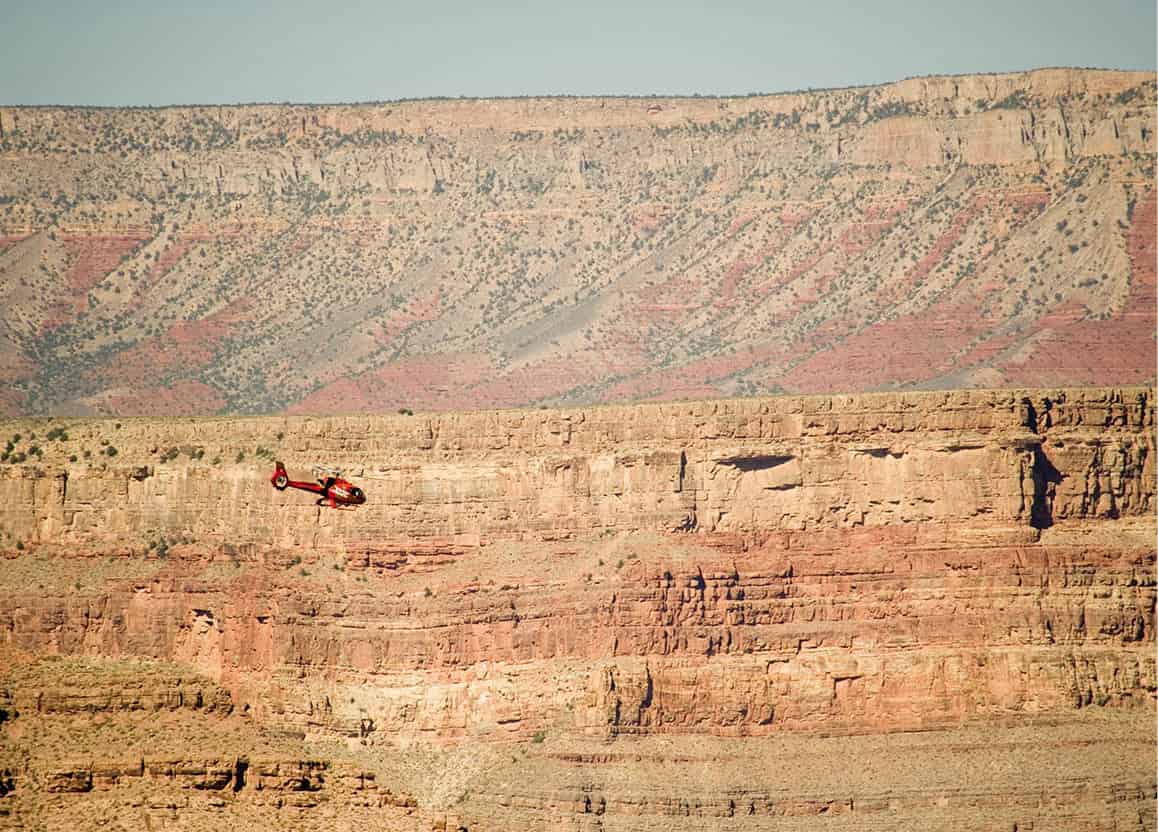
Helicopter tour over Grand Canyon West
Al Argueta/Apa Publications
P
Post
The Downtown post office is located at 201 Las Vegas Boulevard South, Site 100, and is open Monday to Friday 8.30am to 5pm. The post office at the airport is open Monday to Friday 9am to 1pm and 2pm to 5pm.
Effective first-class domestic postage rates are 47 cents for the first ounce (28g) with 21 cents for each additional ounce. Postcards are 34 cents each.
S
In keeping with the Sin City approach to life of “anything goes,” smoking is very common in Las Vegas, especially on the casino floor. Smoking is not permitted in restaurants, bars serving food, at the airport, or the convention center. Hotels offer non-smoking rooms, but if you are sensitive to cigarette smoke, choose one that is entirely non-smoking and patronize establishments with clear non-smoking policies.
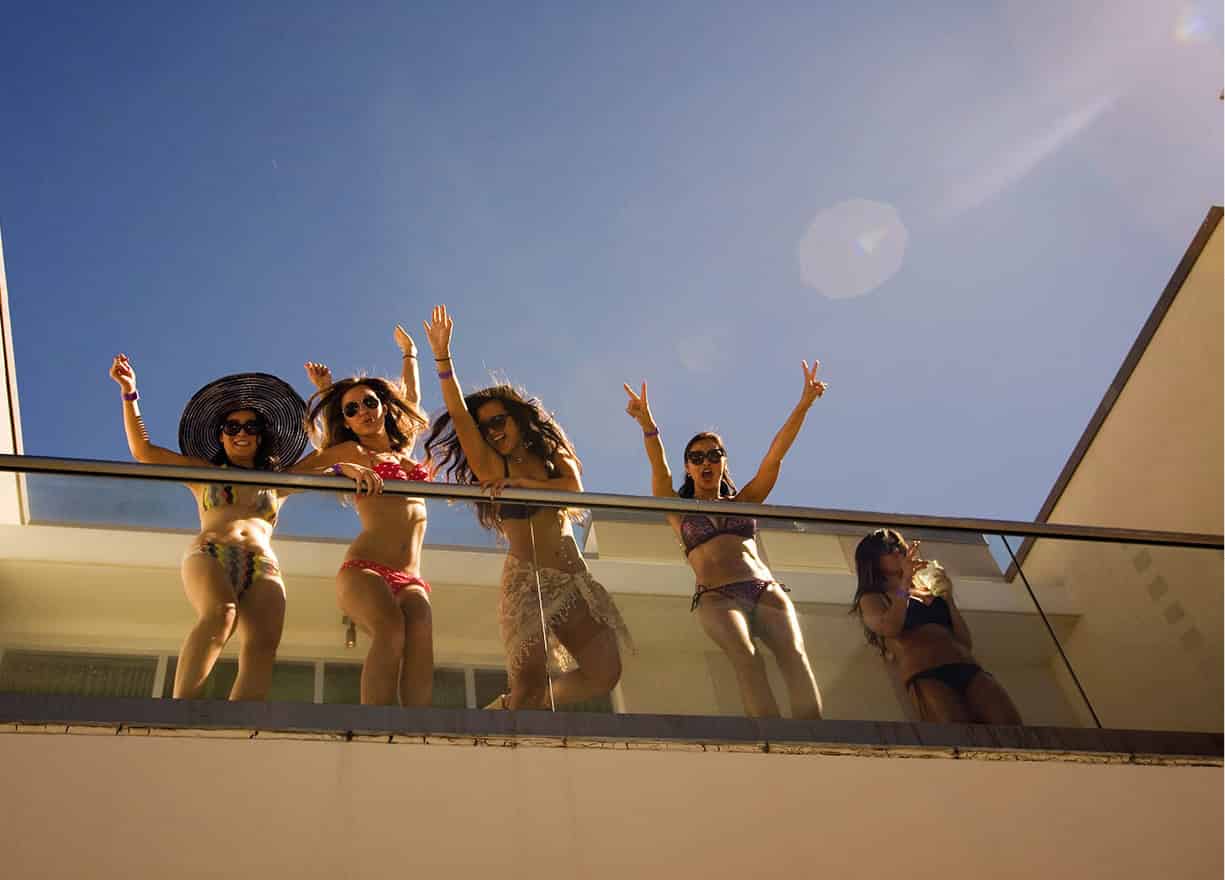
Pool party
Al Argueta/Apa Publications
T
Telephones
The area code for Las Vegas is 702. Local calls are free (although some hotels impose an access charge for in-room calls). Calls from a coin box will require change, a credit card, or calling card available at many supermarkets. Some callboxes offer Internet access by the minute. For local information, dial 411.
The sheer number of shows and concerts in Las Vegas is staggering. There’s something here for everyone, from the Folies Bergère to lounge acts, the cerebral antics of the Blue Men, or concerts by headliners such as Elton John and Celine Dion. Tickets usually go on sale three months in advance for the most popular shows. For the best seats, call the day these go on sale – they sell out very fast – and expect to pay $150–$220 per person.
If an event is sold out, you may be able to get tickets (at super-premium prices) through a reputable online broker such as www.tickco.com. Avoid buying tickets through eBay and other auction sites, as fraud is rife. High-rollers in the casinos are often given complimentary premium show tickets as an added incentive, so if you want Las Vegas at your feet, win big.
Time differences
Most of Nevada is in the Pacific Time Zone: two hours behind Chicago, three hours behind New York, and eight hours behind London.
Tipping
Tipping (often called ‘tokes’ in Las Vegas) is the grease that keeps the machine of Las Vegas operating, far more than in other American cities.
Most tipping is in the $2–5 range, but sometimes a larger tip will help things move along. No table available at a big hotel restaurant for hours? A $10 or $20 bill will usually get you a seat immediately. Valet parking full? Try $5 first, more if it is a holiday or special event, and a space will often magically appear. If at valet pick-up a huge group of people are already waiting for their cars, waits of up to 20 minutes are not uncommon; however, a bill with the right picture on it handed to the ticket taker with a request to speed up the process will almost always have you out pretty quickly. When you tip under these circumstances, do so discreetly.
Restaurant tipping ranges between 15 to 20 percent of the total bill before taxes. A good tipper will go to 25 percent for extraordinary service. Be warned: some restaurants automatically include a 15 percent surcharge for large tables; you may argue the charge if service is poor. If it is included, you may of course add a small percentage for exceptional service. Remember, if service is bad, you are not obligated to tip, but select another server the next time you visit that establishment.
Here are some general suggestions for how much to tip, but when in doubt, always overtip: in Las Vegas, this may improve your vacation immeasurably:
Bartenders: $1–2 per round for two or more
Bellmen: $1–2 per bag
Cocktail Waitresses: $1–2 per round
Concierges: $5 and up, depending on service
Doormen: $1 per bag, $1 for cab call
Limo Drivers: 15 percent of total bill
Maids: $2 per day, left at the end of stay
Pool Attendants: $1
Taxi Drivers: 20 percent
Valet Parking: $2 when car is returned; $5–10 to find a spot on a busy night; $5 to ticket taker for fast return
Wait Staff (Restaurant): 15–20 percent of total before taxes
Wait Staff (Showroom): $5–10
Tipping in Casinos
Change Attendants: 5 percent and up, depending on your luck and their interaction.
Cocktail Waitresses: $1, particularly if the drink is free; tipping with gaming chips is acceptable as well.
Dealers: If you are winning, tip the dealer by placing a bet for him or her, one-half of your bet; when leaving the table in the black, tip according to your conscience.
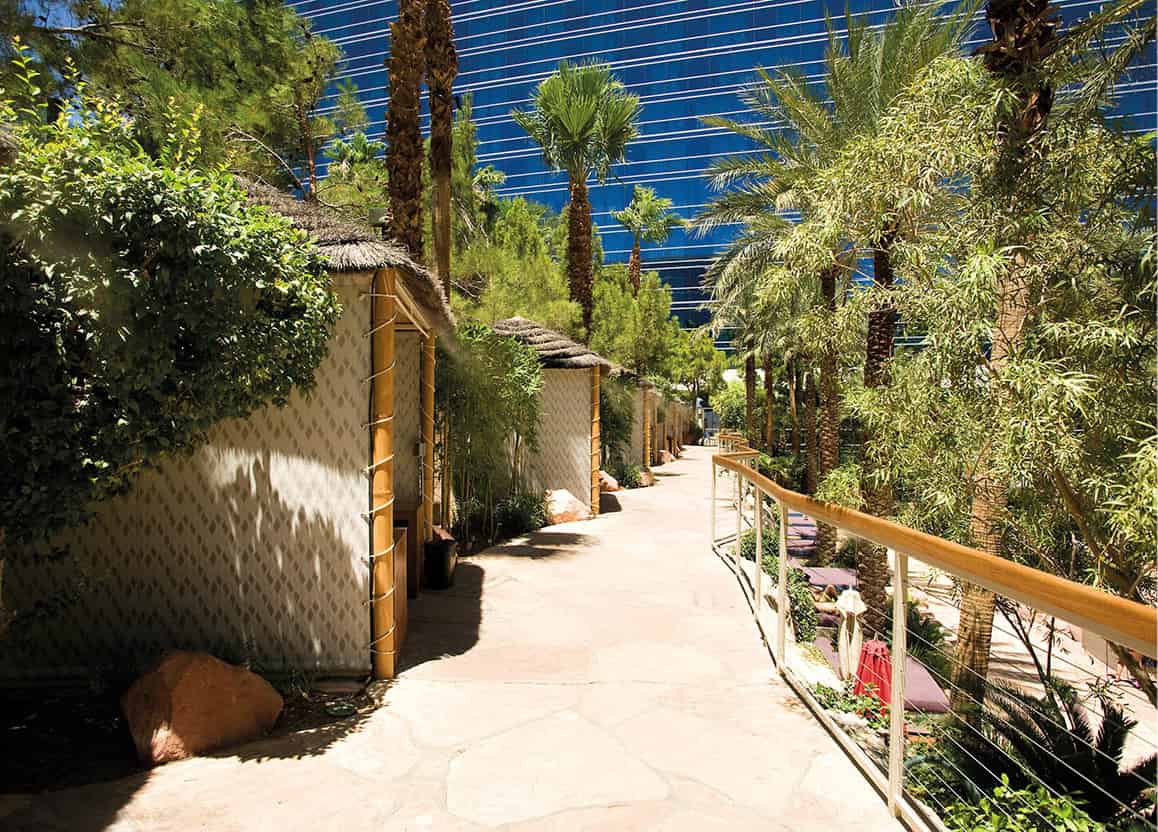
Cabanas line the swimming pool at the Hard Rock Hotel
Al Argueta/Apa Publications
The main one-stop shop for information is Las Vegas Convention and Visitors Authority (3150 Paradise Road (corner of Desert Inn Road); tel: 702-892-7575; toll free 877-847-4858), which has specialized information on everything from getting married to facilities for disabled travelers to visiting with kids.
LVCVA has tourist information offices abroad to help you plan your trip. Other good sites include www.vegas.com for attractions, and www.lvchamber.com for events and local news.
The State of Nevada Welcome Centers (www.travelnevada.com) also offer good information, if you’re driving to Las Vegas. There are Welcome Centers at Mesquite, near the Utah state line, and Primm, near the California state line.
Transportation
Airports and arrival
Most people fly or drive to Las Vegas or arrive by Greyhound bus. There is no longer any rail service to the city. Vegas is served by McCarran International Airport (http://mccarran.com), 1 mile (2km) from the Strip and 5 miles (8km) from Downtown. One of the 12 busiest airports in the world, it has 1,100 flights daily via 40 different carriers and direct connections to 125 US cities. The most economical way to reach your hotel is by 24-hour shuttle; fares to the Strip and Downtown are less than $20. Taxi fares start at $3.70, with $2.80 per mile (2km) thereafter.
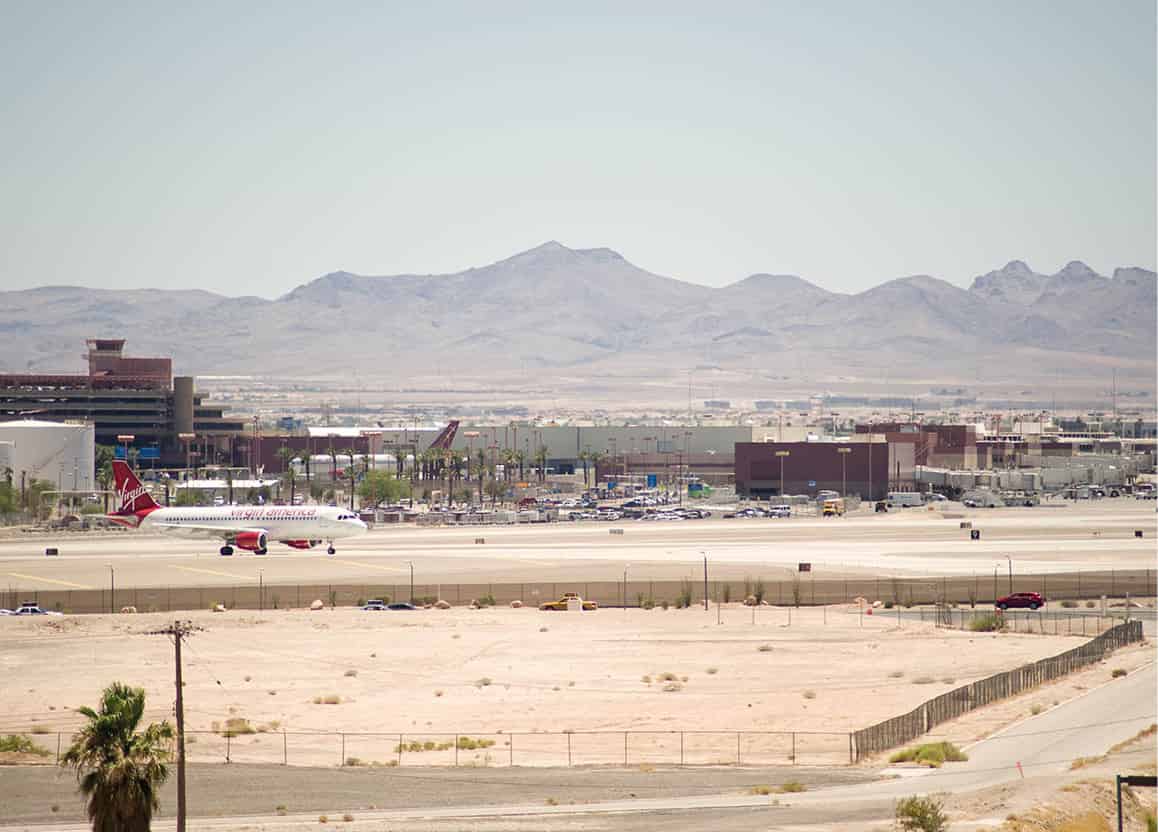
McCarran International Airport
Al Argueta/Apa Publications
Car rental
All the major car rental companies have kiosks at the airport; rates begin at $35–40 per day. You must be 21 or over (25 at some locations) to rent a car and have a valid driver’s license and at least one major credit card. Air-conditioning is vital, if you don’t want to cook inside your vehicle. Dream Car Rentals (tel: 877-707-8342) and Gotham Dream Cars (tel: 877-246-8426) specialize in exotic cars. Eaglerider (tel: 702-876-8687) rents motorcycles.
Las Vegas has wide boulevards, and getting around by car is easy. Parking isn’t allowed on the Strip: use free valet parking at hotel casinos and then tip the valet a couple of bucks.
Driving
The main route through Las Vegas is Interstate 15 (I-15) from Los Angeles, California, a four-hour drive away, substantially longer when traffic is heavy on holiday weekends. I-15 continues north, through scenic Virgin River Gorge to Saint George, Utah, a good jumping-off point for national parks including Zion, Bryce, and the Grand Canyon. I-15 continues north to the state capital of Salt Lake City. If you’re driving from Phoenix, Arizona, take Highway 93 north via I-40 and Hoover Dam to Las Vegas.
A word of caution: If you plan on driving through the desert, be sure to carry a good map, a spare tire, extra water – at least a gallon (4 liters) per person per day to avoid dehydration – nutritious snacks, and let someone know where you are going. A cell phone is a good idea but may not work in some areas; the same is true for GPS units powered by satellite.
Service stations may be few and far between outside Las Vegas; fill up when you can. If your car breaks down on a back road, don’t attempt to strike out on foot, even with water. A car is easier to spot than a person and provides shelter from the elements. Sit tight and wait to be found.
Public transportation
Public bus transportation is operated by Citizens Area Transit (CAT). There are numerous bus routes throughout the area; a one-way fare on the Strip costs $4, and slightly less in the rest of the city. Buses on the Strip run 24 hours a day, seven days a week. For the latest information and scheduling, call cat-ride (tel: 702-228-7433; www.rtcsouthernnevada.com). A trolley runs the length of the Strip 9.30am to 1.30am. Reasonable fares and good-value day passes are available.
The privately funded Las Vegas Monorail (Mon–Thu 7am–2am, Fri–Sun 7am–3am) travels along the east side of the Strip behind the resorts, from the SLS Hotel to the MGM Grand, with the following stops in between: Las Vegas Hilton, Las Vegas Convention Center, Harrah’s/The Linq, the Flamingo/Caesars Palace, and Bally’s/Paris.
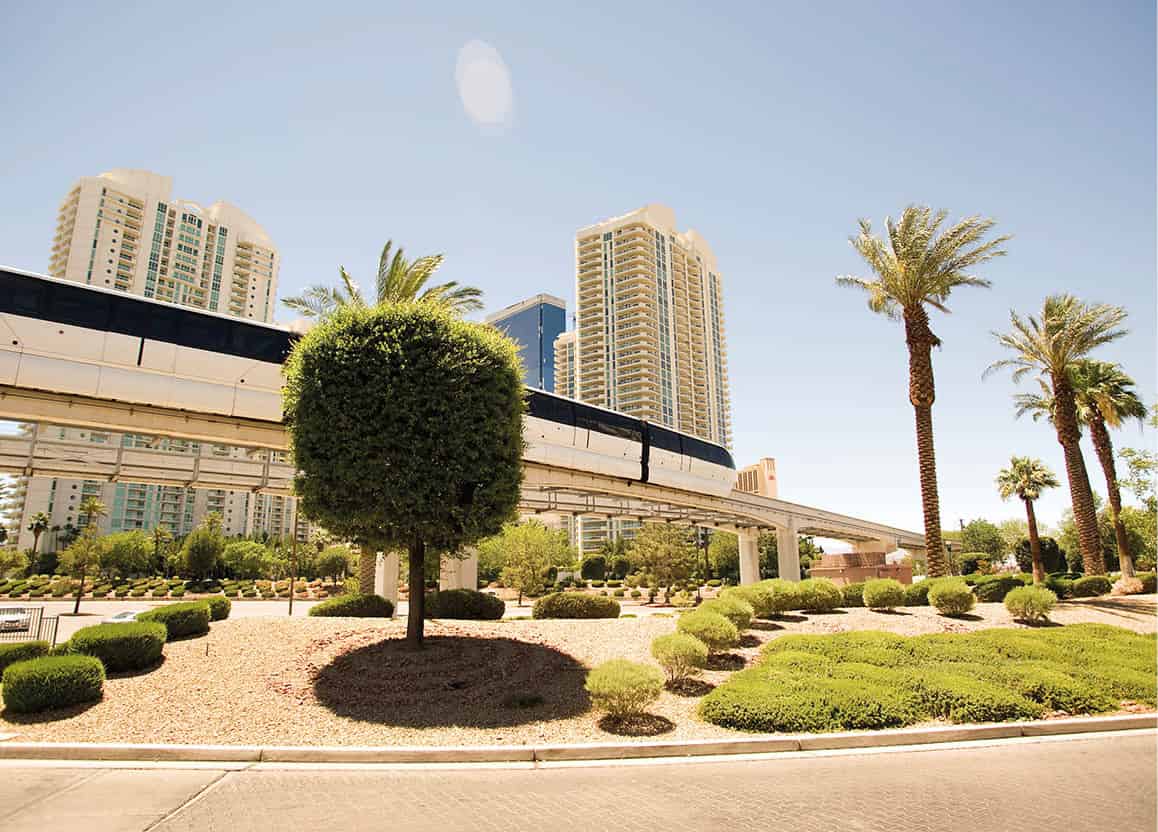
Las Vegas Monorail
Al Argueta/Apa Publications
V
Visas and passports
Foreign travelers to the US (including those from Mexico) must carry a valid passport and a short-term visa, known as an ESTA. For those who are planning on visiting for more than 90 days, a different visa is required. Regulations are frequently subject to change so for the most current information, contact the US Department of Homeland Security at www.dhs.gov.
W
Websites and Internet cafés
Log on to the Las Vegas Convention and Visitors Authority website (www.lvcva.com/) to plan your trip. Other websites are noted in “Tourist information” (for more information, click here).
Almost every single hotel and hostel offers Wi-Fi. If they don’t, then you need to change accommodations because you’ve accidently gone back in time and booked into a cave. Some will be free, others will be charged. Chances are, the big hotels on the Strip will charge and the cheaper motels won’t. There are also a number of free hot spots all around the place, like any one of the many, many Starbucks coffee shops; most bars provide free Wi-Fi and even some shops. All you have to do is ask.
If you do not have a computer but want to check your email or surf the Internet, check out one of the local Internet cafés. They include Pride Factory (Suite E-1B, Commercial Center, 953 East Sahara Avenue; tel: 702-444-1291; www.pridefactory.com; daily 10am–midnight) and Elysium Internet Cafe (7875 West Sahara Avenue, #101; tel: 702-307-4931; daily, 24 hours).
Although very expensive to use, there are branches of FedEx’s between the Strip and the convention center (tel: 702-951-2400; daily 24 hours), near the UNLV campus (tel: 702-735-4402; daily 7am–midnight), and near Downtown (tel: 702-383-7022; daily 7am–11pm). They each have a T—Mobile Wi-Fi Hotspot.
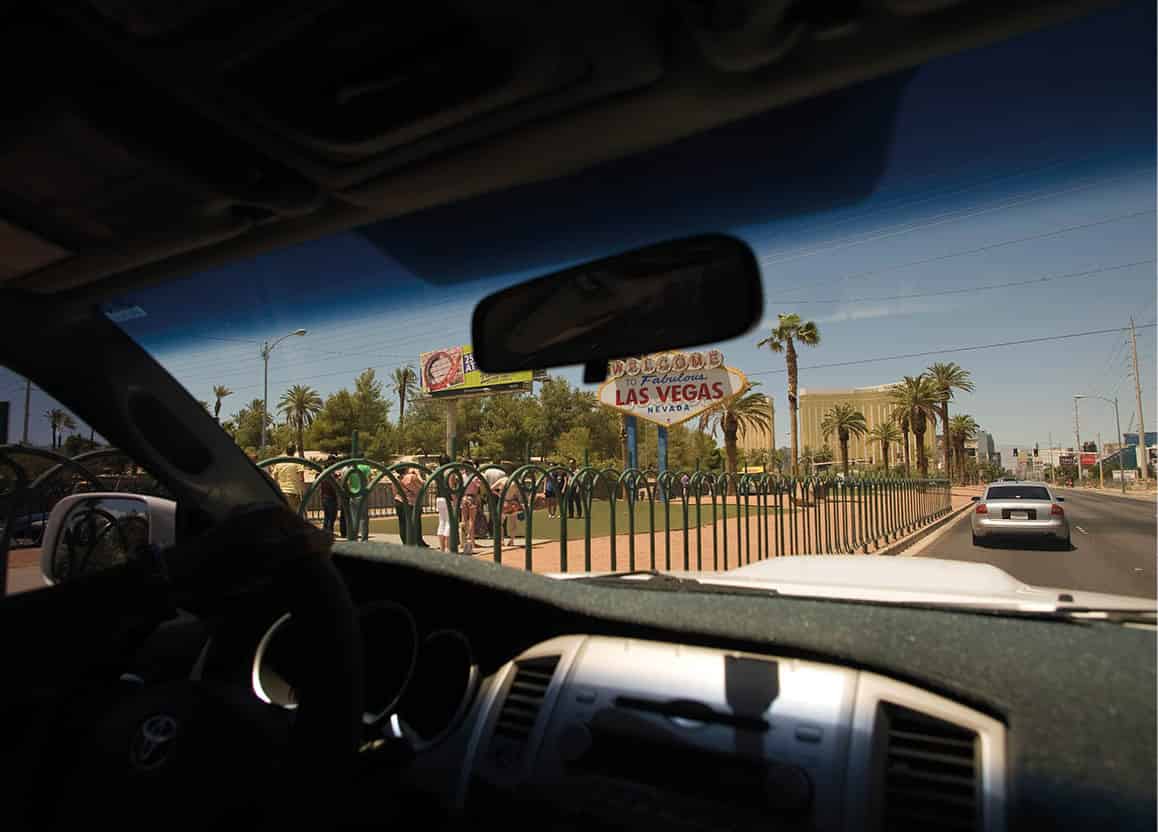
Driving into Las Vegas
Al Argueta/Apa Publications
Weddings
With its easy-to-obtain marriage licenses and thousands of over-the-top nuptial options, Las Vegas is the wedding capital of the world. Neither blood tests nor waiting periods are required if you want to tie the knot. The legal age is 18 for both men and women (proof of age is required) and licensing fees are $60. Civil ceremonies can be performed at the Marriage Commissioner’s Office at 309 South 3rd Street Chapel; fees vary depending on the services provided. For marriage license information contact the Clark County Marriage License Bureau (201 Clark Avenue; located on the northwest corner of Clark Avenue and 3rd Street; tel: 702-671-0600; daily 8am–midnight, including holidays).
Same-sex marriages aren’t recognized in Nevada but same-sex commitment ceremonies can be arranged through gay-owned Viva Las Vegas Villas & Wedding Chapel (800-574-4450; www.vivalasvegasweddings.com).
You can get married in Vegas even if you’re not a US resident. To recognize the union legally, most countries require a certified copy of your marriage certificate ($10) and an apostille from the Nevada Secretary of State ($20). Contact your home country’s consulate office in Washington, DC, to inquire if additional certifications are required.
Weights and measures
Despite efforts to convert to metric, the US still uses the Imperial system of weights and measures. However, note that the US gallon is approximately 16 percent smaller than the standard Imperial gallon.
Women
Like New Orleans, Las Vegas is unabashedly a party town, where you are encouraged to act out on your fantasies, lubricated by large quantities of low-cost alcoholic drinks and a permissive attitude enshrined in Vegas’s marketing theme: “What happens in Vegas, stays in Vegas.” For women, this can be a mixed bag. In such an atmosphere, men are encouraged to view women as objects for their pleasure, and the old stereotype of the high-roller and his beautiful call girl is still very much a part of the scene, even though prostitution is officially illegal.
However, that said, in these modern times you’ll find just as many groups of girls doing exactly the same thing as groups of guys are doing. If you’re a solo woman, you’ll find plenty of flirting in Las Vegas’s burgeoning club scene. Unfortunately, you may also receive some harassment by obnoxious drunken young men. Without a doubt, there’s safety in numbers.